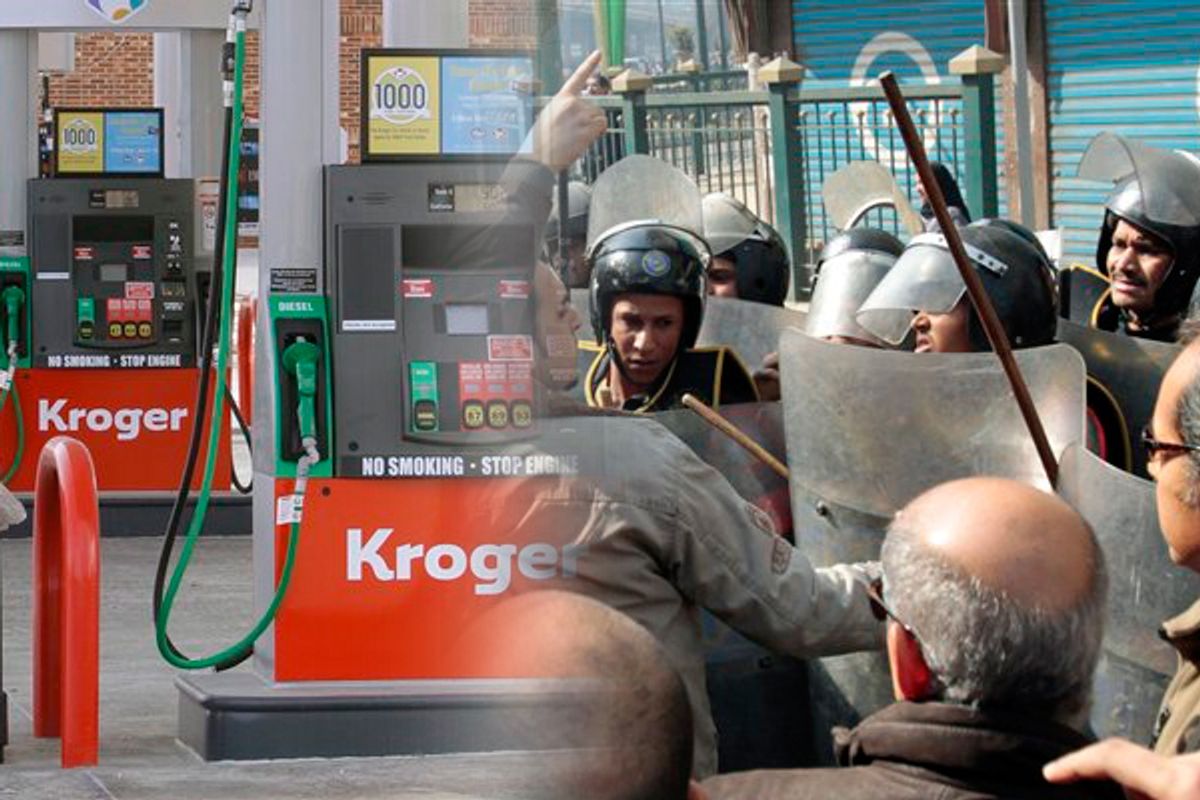Oil tanker stocks surged Friday, on fears that Eygptian unrest could lead to a possible closure of the Suez Canal, forcing ships to go the long way around Africa to deliver their cargo. The worry may be overblown, but the government's response to the protests is making it hard for shipping companies to find out what's going on. One of the region's biggest shipping logistics companies, GAC, reported that "Due to Internet and mobile telephone connection problems in Egypt, GAC Egypt's Suez Canal Coordinating Office is unable to receive messages by e-mail."
Also on Friday, oil prices spiked to near $100 a barrel, generated not only by concerns about the canal but also by the prospect that the wave of protests that began in Tunisia and is now crashing over Egypt might set off a domino effect of popular uprisings throughout the Mideast. And as we have come to expect when the world gets scary, investors everywhere fled to the safety of the dollar.
Could 2011 be the Mideast's equivalent to 1989? On first glance, the comparison seems dubious. The nations that have so far witnessed the most popular discontent are not big oil producers. The two things that Tunisia, Egypt and Yemen all have in common is that their economies are in terrible shape and they are structurally republics that have in fact become dominated by autocratic strongmen. Combine high unemployment and high inflation with thwarted democratic aspirations and you have a recipe for profound dissatisfaction.
In contrast, the oil-rich states are, at least theoretically, much more secure. Their economies are in much better shape, giving their ruling dynasties the resources to buy off discontent. If Egypt sat on Saudi Arabia's oil reserves, it's a whole different ballgame.
But who knows? It can be hard to recall now, but the chain reaction of regime change that swept across Eastern Europe in 1989 took just about everyone by complete surprise. An entire generation of Arabs are watching the Egyptian protests on Al Jazeera and potentially wondering why not us? It's no wonder traders are bidding up oil prices; the consequences of major turmoil throughout the Mideast are incalculable. Nothing could kill the global economic recovery faster than a new oil shock.
The powers that be are certainly getting nervous. At Davos, Switzerland, where the high and mighty are meeting at the World Economic Forum, German defense minister Karl-Theodor Guttenberg told Reuters "there is risk of infectious momentum." That's a funny way to describe the phenomenon of people rising up against oppressive rule!
And it suggests another comparison with 1989. One of the less remarked upon outcomes of 1989 was the integration of hundreds of millions of new workers into the global economy as the countries of Eastern Europe left behind the autarchic days of the Eastern bloc. The influx of cheaper labor undoubtedly put downward pressure on the wages of workers in the West.
But from a global perspective, would we want it any other way? Surely the gains in human freedom are worth the adjustment pains. Viewed from this prism, maybe tomorrow's oil shock, set off by a grass fire of direct popular action, should be welcomed with open arms.
UPDATE: Here's a terrific example of the difference between oil-rich and oil-poor states in the Mideast. SkyNews is reporting that Kuwait's Emir just "ordered the distribution of $US4 billion and free food for 14 months to citizens as the oil-rich emirate prepares to mark national occasions."



Shares